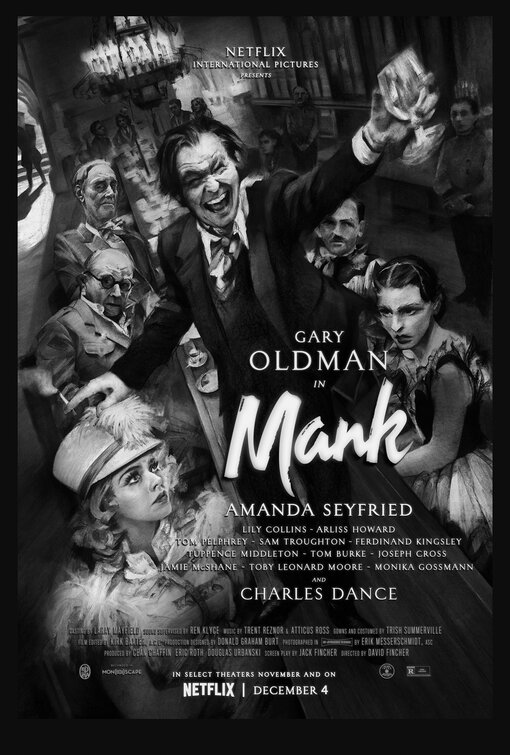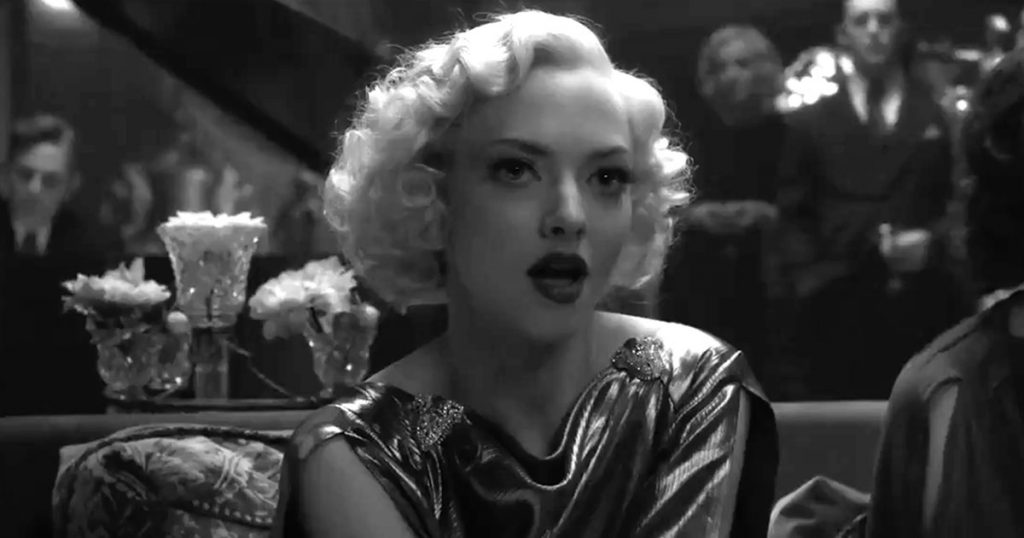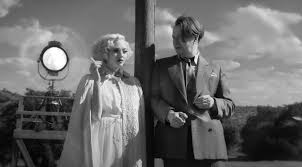Posts Tagged ‘Joseph Cross’
The Organ Grinder’s Monkey
Mank

Director: David Fincher
Cast: Gary Oldman, Amanda Seyfried, Tom Burke, Ferdinand Kingsley, Arliss Howard, Charles Dance, Lily Collins, Tuppence Middleton, Toby Leonard Moore, Monika Gossmann, Joseph Cross
This Film is only available on NETFLIX
The Social Network director David Fincher returnswith the unbelievably brilliant story of the screenwriter Herman Mankiewizc in the 2020 film about 1930’s Hollywood Mank starring Oscar winner Gary Oldman as the erudite, heavy drinking screenwriter who become extraordinarily famous when he won the best original screenplay for the most iconic film ever made, director Orson Welles’s Citizen Kane (1941) inspired by the real life story of American media billionaire William Randolph Hearst and his illicit romance with the gorgeous silent screen film star Marion Davies, 30 years his junior.
Fincher cleverly frames every alternate scene in Mank with the formatting for writing screenplays, however what really dazzles is the superb script written by Fincher’s father Jack Fincher.
What is especially thrilling to watch is Gary Oldman delivering another superb performance as the tortured screenwriter who after breaking his leg in a car accident is confined to a ranch in California to finish the original screenplay for the demanding Orson Welles played by Tom Burke.
Oldman’s performance is a companion piece to his Oscar winning turn as Sir Winston Churchill in 2017’s film Darkest Hour. The frame of his character is the same. Mank has young women assisting him, in this case Rita Alexander played by Lily Collins and Fraulein Frida played by Monika Gossmann. Then there is Herman Mankiewizc’s long suffering wife Sara, wonderfully played by British actress Tuppence Middleton (The Imitation Game, The Current War).

What is so masterful about Mank are the fabulous flashback scenes to Mank’s platonic enchantment with the dazzling silent screen diva Marion Davies, superbly played by Amanda Seyfried, who loves to make an impressionable exit especially out of a studio lot.

In these brilliantly executed scenes, Mank and Marion are seen conversing amidst drinks and cigarettes on Hearst’s massive estate, on his bankrolled film sets and more significantly in the social shadow of William Randolph Hearst’s friendship with studio executive Louis B. Mayer who founded Metro-Goldwyn-Mayer or better known as MGM studios a rival to Paramount.
Hearst is played with a regal elegance by famed British character actor Charles Dance (White Mischief) while Mayer is played with an unrecognisable talent by Arliss Howard. Toby Leonard Moore plays David O. Selnick, the producer of Gone with the Wind.
By far the most extraordinary scene in Mank is the fancy dress dinner party in 1937 whereby Mank, utterly drunk, storms into the lavish setting and proceeds to lambast the most important guests at the table including Hearst, Mayor and Marion Davies.
Hearst after Mank’s tirade coolly escorts the inebriated screenwriter out of his mansion reciting the story about the organ grinder’s monkey, alluding to what Mank really is: a clown in a major larger circus. That circus is and always will be show business.
Any aspiring filmmaker or film analyst studies Citizen Kane, and Mank is a very specific film, a cineaste’s tribute to the Golden age of Hollywood in the 1930’s and 1940’s. It’s best to research the period between 1934 and 1942 in Hollywood to appreciate Mank’s extraordinary elegance and cleverly crafted story.
Mank is sumptuous, intelligently told and Gary Oldman holds the entire film together in his witty and cantankerous fashion giving Mankiewizc a quality of genius bordering on the tragic.
Mank gets a film rating of 8.5 out of 10 and is a film lover’s tribute to cinema, ironically streaming on Netflix and not available in cinemas.
Activism and Martyrdom
Milk
directed by
Gus van Sant
The article below was prepared for a film workshop and discussion of Milk held at the inaugural Durban Gay and Lesbian Film Festival November 2011.
“My name is Harvey Milk and I want to recruit you”.
These words were used at a speech Milk made on the San Francisco City Hall steps as an elected city supervisor at the Gay Freedom Day Parade on the 25th June 1978 four months before being assassinated. This scene in Gus Van Sant’s film is critical to the viewing of Milk as not just as a film about the Gay rights movement in America, but a film about civil rights and the fight for protection against bigotry and the preservation of individual freedoms which should be enshrined in any democracy.
Milk was an activist for Gay rights and for human rights and he galvanized the communities of Castro Street in the Eureka Valley and also the Haight-Ashbury district of San Francisco for the protection of civil liberties. Milk was also the first openly gay man to be elected to an official position in a major metropolitan American city. He was a south-African equivalent of an Executive councillor and not merely a ward councillor.
Historically any political movement with a strong base of supporters, martyrdom works. There are examples of martyrs in a range of socio-political movements worldwide from Gandhi to Martin Luther King, to Ruth First. Milk knew of the risks he was taking as an openly gay supervisor who was ready to engage in public debate at a time when the gay rights movement was blossoming along the American West Coast.
Milk was ready to die for his beliefs and was already casting himself in the role of a martyr – he persevered in the face of constant death threats. He challenged opposing viewpoints which were mostly grounded in the form of religious bigotry and parochial conservatism crystallized in the form of Florida religion fanatic Anita Bryant and Californian Republican Senator John Briggs.
Milk stood up for what was right at a particular moment in a historical context which reflected the aftermath of the sexual revolution of the 1960s, and followed on from similar social political movements in America most notably the civil rights movement of the 1960s and the anti-war demonstrations of the late 60s and early 70s (notably about the Vietnam war). Harvey Milk was a skilled political activist and knew how to mobilise his supporters effectively.
Milk’s challenge to gay and lesbian people in America was this – We have to let them know who we are. You have to be open about your sexuality. He was the political version of the current crop of Hollywood stars and singers who are breaking through the glass closet Zachary Quinto and Ricky Martin, David Hyde Pearce, Neil Patrick Harris.
As a film, Milk was hugely successful for 3 reasons –
1) Director Gus van Sant is an openly gay director and has touched on homosexuality in his previous films, My Own Private Idaho and his award winning film Elephant.
2) The screenwriter Dustin Lance Black who won an Oscar for best adapted screenplay was openly gay.
3) Milk as a film was researched and had the input of surviving members of the Gay rights movement of the 1970s notably the influential Cleve Jones, played by Emile Hirsch in the film, Milk was shot in all the actual locations in and around San Francisco, notably the City Hall and Castro Street neighbourhood. Van Sant encouraged all the actors to improvise in their characters in the authentic locations they were shooting in. Seasoned actor, Sean Penn’s performance of Harvey Milk is exceptionally brilliant, notably winning him a 2nd Best Actor Award.
There is a moment in Milk when Harvey is delivering the recruitment speech at Gay Freedom Parade that this biopic transcends the boundaries of being just a film about gay rights, but a film about justifiable civil rights. Ironically the call for recruitment sounds very similar to Uncle Sam calling for new army recruits to the US military. Gay people came to San Francisco from small towns across America and the gay community swelled after the end of World War 2 when many closeted military men disembarked at San Francisco after returning from the Pacific theatre of War and remained in the city, not obviously keen to return to conservative mid-Western towns.
Viewing Milk in a South African context
South Africa is an intensely political society and as a new democracy which has enshrined the rights of every individual by having one of the most liberal constitutions, gay people are protected by the constitution but is there an adequate justice system to enforce the civil liberties of gay people in SA. This point is made in Milk in the 70s when gay men are beaten up and victimised by SF police officers in the film. Even though gay rights are enshrined in the South African constitution and discrimination based on sexual orientation is forbidden, does the South African police force adequately uphold these rights in contemporary society? In terms of Gay Pride marches worldwide from Sao Paulo to Warsaw – the role of the police as both protector and persecutor is brilliantly explored in the documentary Beyond Gay: the Politics of Pride.
Best line in the film – “I sound like a homosexual with Power” – from being marginalised to being politicized that was the legacy that Harvey Milk gave to the American and the international gay rights movement.
Harvey Milk was a quintessential Gay politician who only served in office for one year but his impact on social change and his symbol as a martyr for the gay rights movement in America and internationally is huge. Milk was 40 years old when he first came out the closet and started living as an openly gay man.
The character of Dan White played by Josh Brolin in Milk represents a complete dichotomy from Harvey Milk. White was also a fellow city supervisor from a strong Irish Catholic neighbourhood who was concerned more with supporting a family on a municipal salary than supporting any of Harvey Milk or Mayor George Moscone’s liberal city ordinances. Dan White viewed Harvey Milk as a threat and he acted upon that threat, whereas Milk underestimated the danger of Dan White as a potential enemy. The last quarter of the film, there is a sense that Milk had almost become cavalier with his political power despite receiving numerous death threats. Milk was willing to become a martyr and for the cause, often remarking that politics was theatre.
Politics is Theatre
Politics is theatre except the scripts are different, but there remain the stars even they become legends as martyrs.
Van Sant skilfully shows not just the extent of the Milk’s activism but also his passion for the gay rights cause at the immense cost of his personal life and safety. The film beautifully reconstructs the fateful events leading up to Milk’s assassination and the truly poignant ending of Harvey Milk being heralded as a martyr by the community he served and adored. Milk is more about Martyrdom and Activism in a socio-political movement in the 1970s and the call for equal civil rights for gays and all other minorities.
Today in San Francisco there are convention centres, streets and public institutions named after slain City Supervisor Harvey Milk and Mayor George Moscone. Corner of Castro and Market Street in Eureka Valley is now called Harvey Milk Plaza.
The immortalization of martyrs for a cause is not new in any political movement and is especially significant in the current SA political context with conference centres, highways and streets being renamed after struggle heroes against Apartheid more appropriately in cities such as Durban and Johannesburg.
Proposition 6 as put forward by Californian Senator Briggs was legislation that allowed the California state to discriminate against employees in this case teachers on the basis of sexual orientation. Milk’s biggest triumph was getting the gay communities and the broader society to vote against the implementation of proposition 6.
Irony is that Gay Marriage in America as a federal law is still banned. Only several US states have passed legislation allowing gay marriage to date including Vermont.
Proposition 8 (ballot title: Eliminates Rights of Same-Sex Couples to Marry. Initiative Constitutional Amendment; called California Marriage Protection Act by proponents) was a ballot proposition and constitutional amendment passed in the November 2008 state elections. The measure added a new provision, Section 7.5 of the Declaration of Rights, to the California Constitution, which provides that “only marriage between a man and a woman is valid or recognized in California.” – Wikipedia source.
Innovative film style of Gus Van Sant –Van Sant’s visual style is unique from extreme close-ups highlighting the intimacy of the characters to showcasing the broad political activism that Milk did to galvanize and protect the gay community in San Francisco in the 1970’s. Political activism involved taking over a block then a neighbourhood and gaining support and credence for specific municipal issues.
Suggested Reading and Viewing: ~
Biography: The Mayor of Castro Street: The Life & Times of Harvey Milk by Randy Shilts
Documentary: Beyond Gay: The Politics of Pride by Bob Christie

